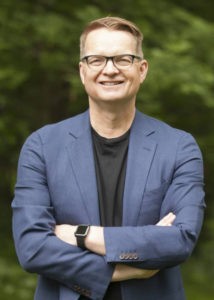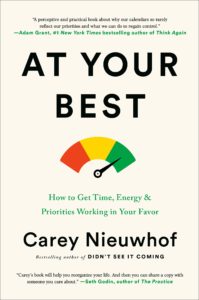As American churches wander in “the wilderness,” pastor and thought leader Carey Nieuwhof is reckoning with his own burnout. He processes these challenges out loud in his new book, At Your Best.
Nieuwhof is founding pastor of Connexus Church in Ontario, Canada, and is a writer, podcaster and leadership consultant to churches and businesses.
Asked his assessment of the Christian church today, he replied: “I think we’re in the wilderness. Haven’t said that out loud. So, I got to test that idea. The wilderness. Yeah. I think the last vestiges of hope that the way it was in March of 2020 will come back are gone because we’ve been through several seasons.
 “Almost everybody, not if you’re in Australia, New Zealand, but in America everyone’s reopened at some level and they’re like, oh, they’ll come back in the spring. They’ll come back at Easter. They’ll come back in the fall while we’re in August, sliding into September. And most (churches) are still at half of where they were. You’ve got a few outlier success stories, and that’s amazing.
“Almost everybody, not if you’re in Australia, New Zealand, but in America everyone’s reopened at some level and they’re like, oh, they’ll come back in the spring. They’ll come back at Easter. They’ll come back in the fall while we’re in August, sliding into September. And most (churches) are still at half of where they were. You’ve got a few outlier success stories, and that’s amazing.
“But I think we’re realizing that the model itself is broken,” he continued. “The mission has never been more important, but the model is broken and there is no clear guide on the way through.”
Nieuwhof sees a connection between this wandering the wilderness and his own experience with burnout. The answer, he believes, is balance.
For the church, “we’re not clear about what the path is,” he said. “So, what it’s going to take is probably younger innovative thinkers who are willing to think outside the box to maybe pretend there is no box, to rethink the mission and the methods.
He quickly clarifies one thing: “I’m all for buildings. I love buildings. Buildings are great. But that whole thing of coming to the building for an hour on Sunday is now not normal. I’ll give you a really good example. If you look at Google Maps for most churches — and I mean just Google any local church in Atlanta — it will tell you right now, Tuesday at 12:45 Eastern, that they’re closed. It’s like closed. Google Maps will tell you your church is closed.
“The only time your church is open is Sunday morning at 8:30, 9:00, 10:00, or whatever. You’re basically open for an hour. The question is, do you want to go to a store that is open for an hour a day?”
Churches are so Sunday centric that they don’t know what to do with Mondays.
Churches are so Sunday centric that they don’t know what to do with Mondays, Nieuwhof said. “And I’ve learned over the last 18 months that I live my life as a Christ-follower Monday through Sunday. Where is the church for most people on a Tuesday, or on a Thursday? And I’m not talking about opening up your building seven nights a week and burning everybody out. We tried that, and it didn’t work either. But rather than expecting people to come to us, maybe it’s time to rethink what it means to go to people. And if you go to people, enough of them might return the visit from time to time.”
Nieuwhof knows the pain of such adjustments on a personal level as well. That’s how he came to write about burnout.
“Burnout itself did two things for me,” he explained. “First, it almost did me in, but second, it was a new beginning, and I don’t think what I’m doing today would have been possible had I not burned out.”
That lesson was not obvious right away, though. “If you asked me that in the first decade since I burned out …, I would have said, ‘You’re ridiculous. Go away. Why do you like torturing me?’ Burnout was awful. But you realize it’s one of those things where you know your greatest pain can also be used for the greatest benefit to others where your wound becomes a healing balm.
“It was deeply painful,” he continued. “I think the run-up to burnout was as expensive as the burnout itself. I was probably clinically depressed for three or four months. I lost all my passion, all my drive and all my energy — which I tend to have a lot of. I kind of thought it was over. I knew it was burnout, but it felt like there was nothing wrong with me, right?
“The run-up to burnout was as expensive as the burnout itself.”
“They could have done a stress test on my heart, and I would have passed. They could have done all of that, but you know it was the decade-by-decade long slide into burnout where my heart was growing smaller. My patience was less, we were growing like crazy at the church I pastored but my character wasn’t. There was no affair. There was no stealing money, but it was all the little things.”
 It is those little things Nieuwhof believes people ignore on the road to burnout. And now, he hopes the difficulty and the stories of his life will resonate in a culture that is trying to navigate the difficulties of life.
It is those little things Nieuwhof believes people ignore on the road to burnout. And now, he hopes the difficulty and the stories of his life will resonate in a culture that is trying to navigate the difficulties of life.
“We have been through the hardest 18 months of everybody’s life,” he said. “I don’t want to discount the medical costs, the psychological costs and mental health costs. However, what the pandemic has given me while applying the principles was an opportunity to rethink everything even at a deeper level.”
One of those lessons is to apply what he calls categorical thinking. “You have a million decisions every day. Should I interview this person? Should I not interview this person? Should I go to the grocery store now? Should I just order takeout? You know we make a million decisions every day. Should we drive the kids or get someone else to drive the kids? It’s a million at home and then a million at work.
Categorical decision-making evaluates individual decisions in groups or categories, so that the person doesn’t have to expend energy making so many small decisions every day.
“Categorical decision-making is something that can really cut through the clutter,” he advised. “A pretty well-known example would be what Mark Zuckerberg or Steve Jobs wore to the job every day. (The same thing every day.) I actually have the same food for breakfast every day now. Category decision making isn’t going to solve your life. It’s a nice little hack along the way but it points to a much bigger thing: If you can think in categories and make decisions in categories, then your life gets a lot simpler.”
Related articles:
Q&A with a traumatologist on how to prevent clergy abuse and burnout
Too many pastors are falling on their own swords | Opinion by Jakob Topper
They’re not coming back | Opinion by Rob Dyer


